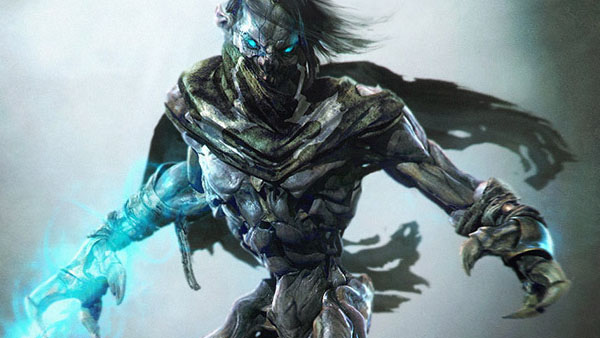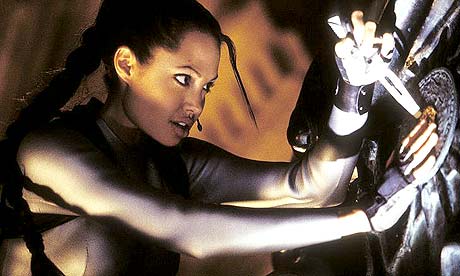The gaming community have been suffering through it for years now, dragged through a cycle of false hope and beleaguered embarrassment as the film industry repeatedly tries and fails to bring our favourite games to the silver screen. The ‘video-game adaptation’ is one of those articles of cinema that has an almost 0% success rate, yet they continue to get green-lit.
Tomb Raider, Resident Evil, Need for Speed, fun games all, but not particularly strong as far as story is concerned. The problem is that a lot of the games that are currently being adapted are relatively recent and game developers have a much better understanding of interactive storytelling now, so even when a game does have a great story, telling it in any context outside of a videogame doesn’t really do it justice. Portal has a fantastic story but it wouldn’t work in any other format. Really then, the ideal games for film treatment are games that had a great story, but were somewhat lacking in the gameplay department and thereby failed to convey it in an engaging way. The best adaptations take an interesting story and use the new format to breathe new life into it, The Lord of the Rings is a great example, taking Middle Earth and looking at it from a new perspective, emphasizing themes that differed from those of the novel but were no less pertinent.
So, here’s my list of videogames that I think would translate brilliantly into cinema, you might not have played all of them, you might not have even heard of some of them, but that’s not the point of this, success and popularity are off the table.
To The Moon
This is one of the more recent games on the list, a short RPG that was released on PC in 2011. To The Moon was one of the earlier entries in a fairly recent spate of callbacks to the classic 90s RPG era of Final Fantasy, Chrono Trigger and the like, it is fondly remembered for being visually sumptuous, having a wonderful score but more than anything else for being one of the most heartbreaking games ever. There isn’t actually a great deal of gameplay to speak of as far as this one is concerned, it guides you through the story with basic point-and-click prompts interspersed with the odd puzzle, there is one humorous moment in which you are wrong footed into thinking you’re about the enter a turn based battle. The premise is simple and engaging: a machine exists that allows people to access and edit people’s memories so that they might be granted a dying wish, they won’t have actually done the thing they’re wishing for but they will be implanted with memories of having done it, placed there by doctors who have explored their minds. It’s kind of like a mixture of Inception, Total Recall and Eternal Sunshine of the Spotless Mind, with the tone being closest to the latter. The story follows someone undergoing this treatment, Johnny, who wishes to take a trip to the moon, the issue with this is that he doesn’t remember why so the two doctors: Eva and Neil, enter his mind to investigate. It’s complex, tragic and often morally polarizing. Since the story is largely built around memory, the science fiction is more thematic than aesthetic, with much of the game-taking place in an ornate mansion. As a film it would make an excellent, thought provoking character drama that could really explore ideas about regret and conflict as the game does.
Persona 4
Japanese RPGs are an interesting and varied breed, they range from the sublime to the bizarre to the pornographic but they are often more heavily reliant on strength of story than anything else. Many fall into the trap of becoming overly convoluted or contrived but every once in a while one will get the formula just right. The Persona series is all based around an interesting premise – the idea that people could summon spectral projections of aspects of their personality. This leads into the typical JRPG realms of fighting monsters and crossing dimensions but with the right plotline behind it, something very compelling could emerge, something that blurs the lines between introspective fantasy, magic and reality.
The reason I singled the 4th game out is that the plot that holds this premise up is fairly interesting: a town being plagued by mysterious murders which involve the victims being found hanging from TV antennas, while simultaneously a rumor spreads about being able to see your soul mate if you peer into an inactive TV screen on a rainy evening. Weird? Yes, but compelling nonetheless. As a film it would have to be complex and broad in scope but if it was handled the right way it could almost shuffle the board of the teen fantasy genre, stretch it and darken it. No anime has ever really had a wholly satisfying live-action counterpart, let alone a Western one and I’d say Persona has all the necessary ingredients.
The Legacy of Kain Series
Starting with 1996’s Blood Omen, the surprisingly little remembered series was a 3rd person hack-and-slash affair that was pretty uninspiring as far as gameplay went but represents one of the finest examples of the ‘anti-hero’ theme in gaming, it was God of War before God of War ever God of Warred. In the first game Kain is a nobleman who gets jumped and killed before being offered the chance to return as a vampire and exact his retribution by a necromancer. What follows is a morality play that reflects on the futility of revenge and the sanctity of life, among other things. With the advent of things like Breaking Bad, anti-heroes are becoming a more popular facet of on-screen storytelling and it’d certainly be nice to spend some time in the company of a vampire who traded sparkling and whining for 8-inch claws, green skin, a missing bottom jaw and an arsenal of dark powers. Kain is a fascinating character, cynical, hateful and misguided and his story loses none of its intrigue through the course of the series, all whilst an overarching plot about the mysterious world of Nosgoth drives everything forwards. The whole series calls the idea of balance into question and never really pins down what’s wrong or right, characters constantly betray each other and nobody’s motives are certain. You could build a really powerful, epic gothic series from this franchise and many fans have long been clamoring for some kind of revival, believing that the limitations of gaming at the time kept the games from reaching their true potential.
Some of the coverage you find on Cultured Vultures contains affiliate links, which provide us with small commissions based on purchases made from visiting our site. We cover gaming news, movie reviews, wrestling and much more.







